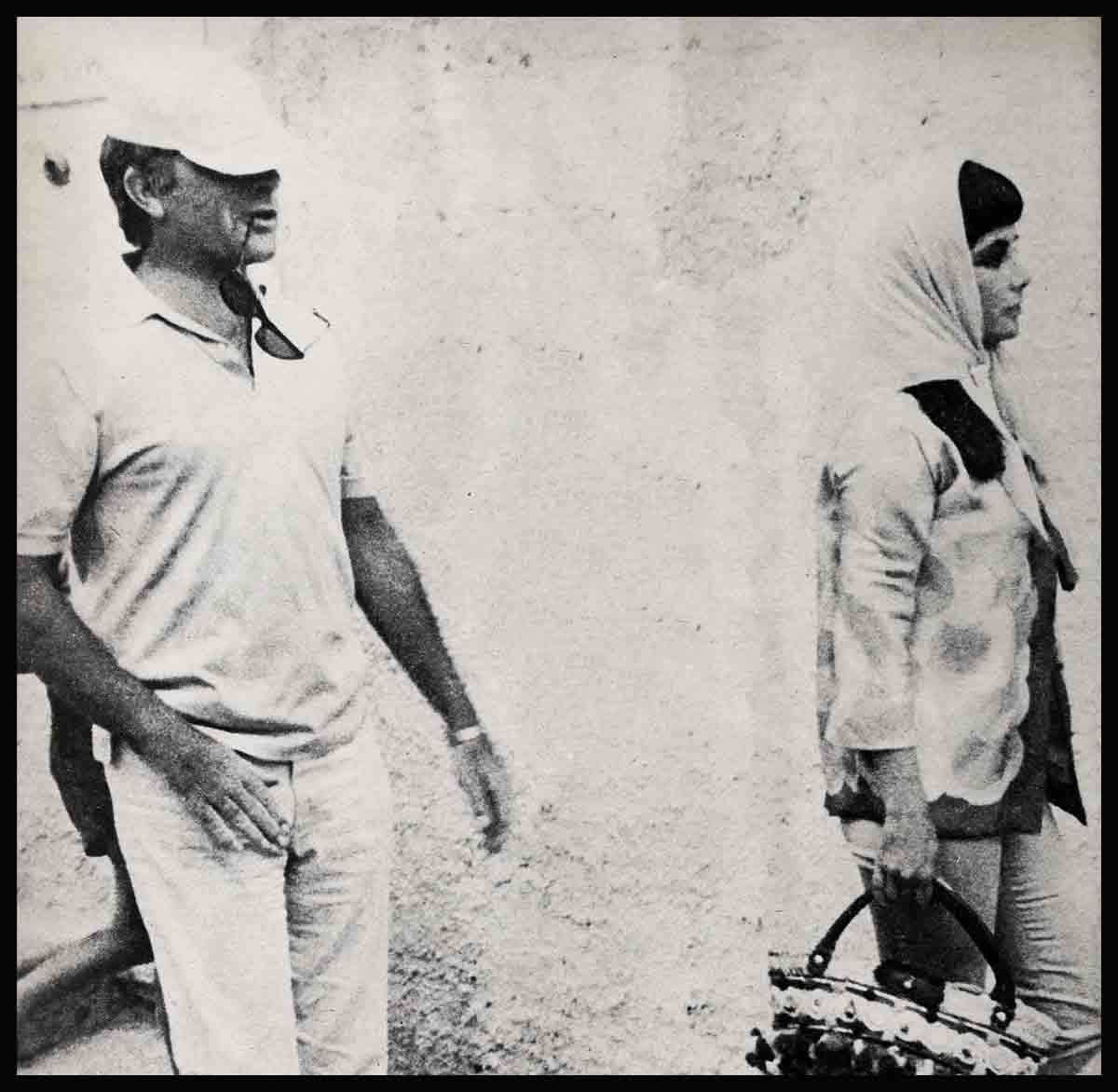
What Elizabeth Taylor Is Doing To Keep Richard Burton
Thirty years ago, Hollywood’s top-money-making star was the magnificent Swedish actress, Greta Garbo. Mysterious, aloof, her private life a closed book, she captivated millions of movie fans who speculated endlessly on what it was that made her tick as a woman.
In that same year—1932—in London, a little girl was born on February 7th and christened Elizabeth. Today Liz Taylor has surpassed the popularity of even the great Garbo and become Hollywood’s most shining star. Unlike Garbo, her life has been an open book.
But for all the miles of newsprint about her, Liz is still as much of an enigma as Garbo.
Miss Taylor, who has lived in the public gaze almost all of her life, is probably the only actress who still arouses the kind of eager curiosity that used to surround all Hollywood stars. For she has involved her fans emotionally.
Most of all they want to know what it is that drives her out of one man’s arms and into the arms of another with such rapidity and regularity. Is she simply flirtatious? Does she have so much love to give that no one man can absorb it all? Or does she require more love than any one man can possibly give to her?
To get the answers to these and other questions, we’ll have to consider everything we know about her and speculate on these facts in terms of modern psychology. What we hope to come up with is what every man who gets involved with Liz should know for his own well-being.
Psychologically speaking, one learns how to love by being loved. Emotional growth stems from healthy relationships with one’s parents.
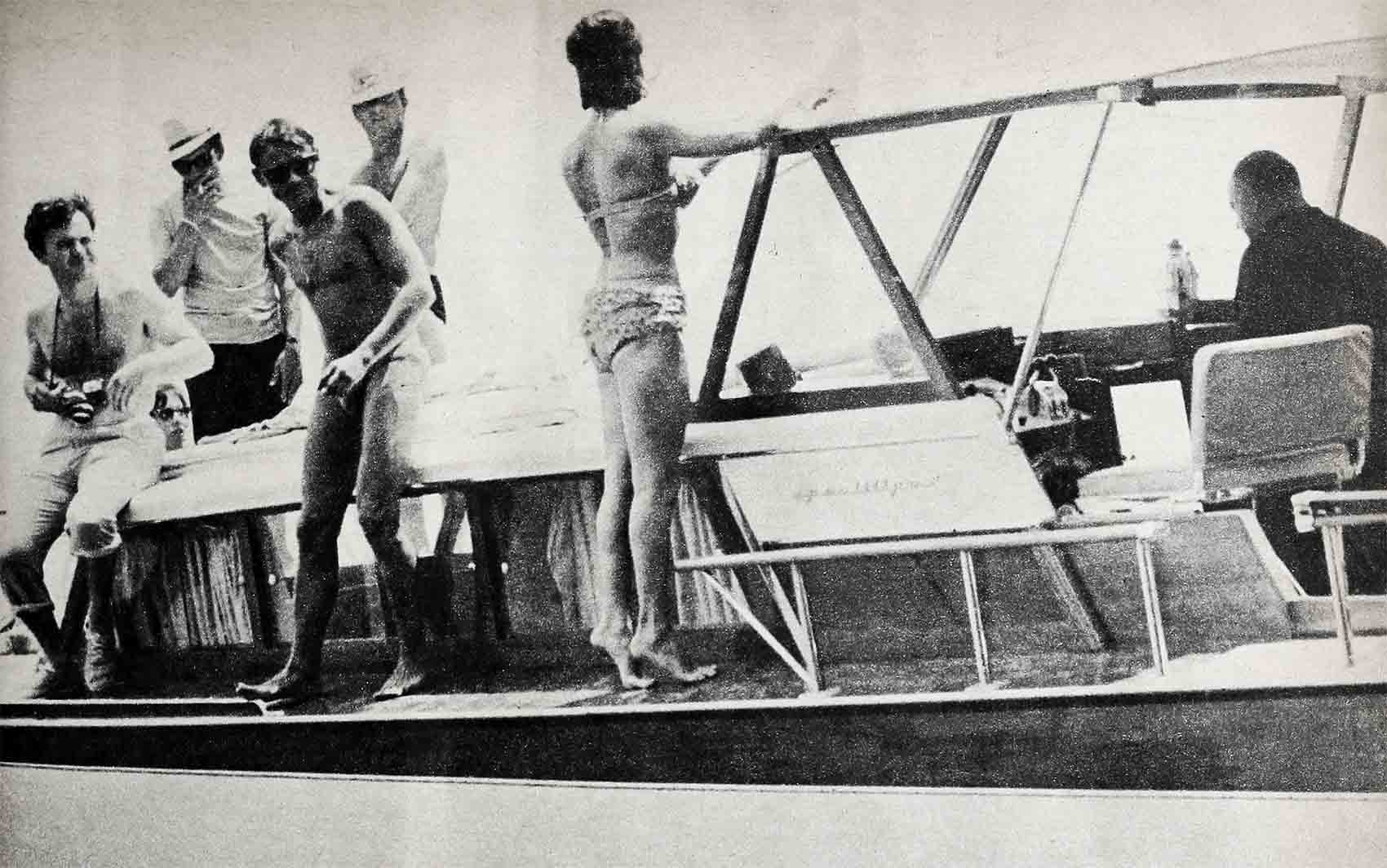
The photos they never knew were being taken!
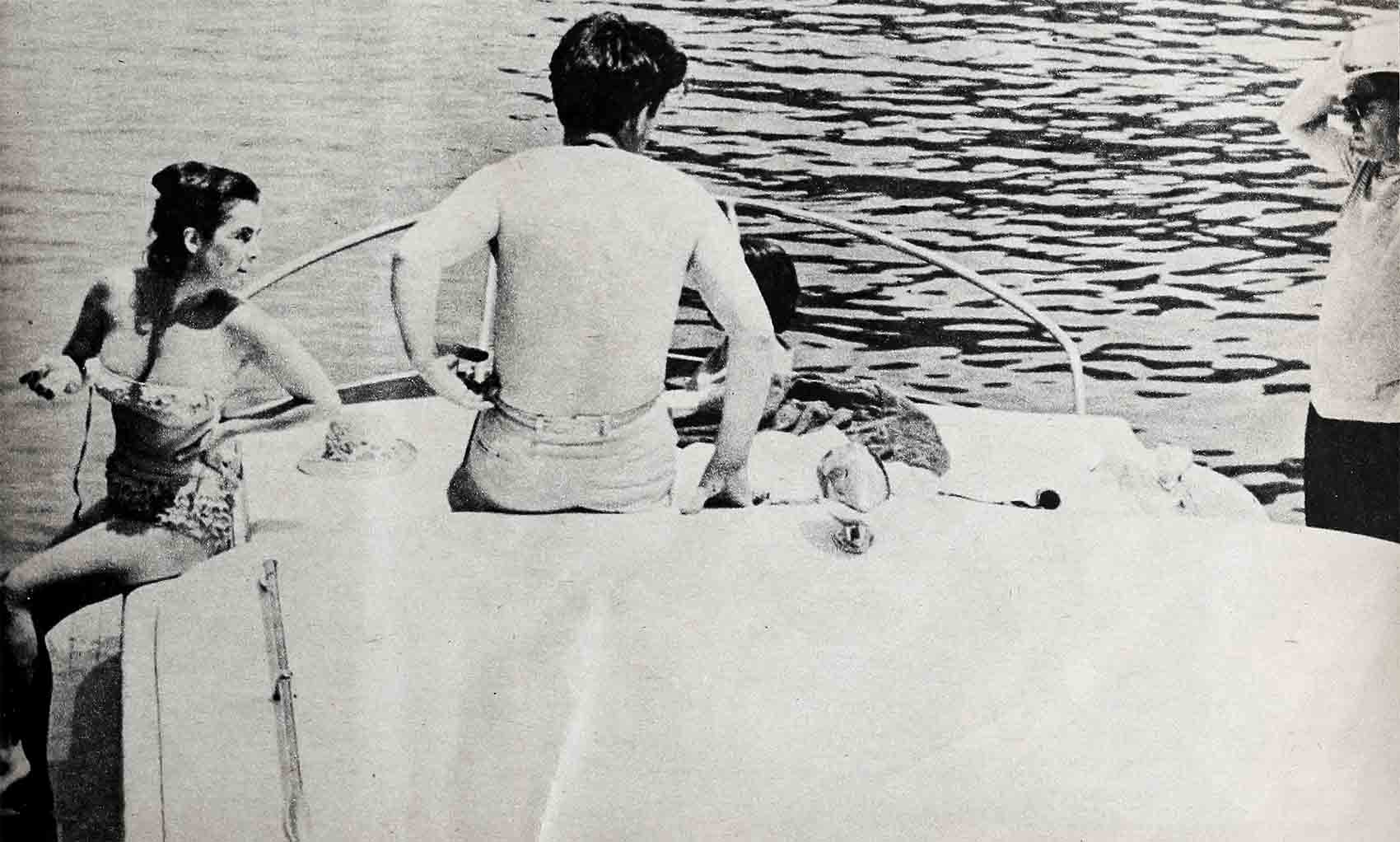
Growing pains: Liz wasn’t the first actress in her family; her mother was an actress before her. Her dad, an art dealer, was reported to be affectionate but aloof. Her mom was the more dominant of the two and endeavored to get both Liz and her older brother, Howard, interested in acting—but Howard would have none of it.
Not so Liz. She was given dancing lessons at the age of two, riding lessons at four, made her first movie at eight and signed a contract with M-G-M when she was all of nine years old.
She is said to have loved behaving as a tomboy. She decorated her bedroom with spurs, saddles and riding crops. When her mother redecorated the room in a more feminine fashion (during Liz’ early teens), the girl wasn’t very happy about the change-over.
As a little girl she received an allowance of twenty-five cents a week, which was upped to fifty-cents a week after starring in “National Velvet.” She was highly disciplined during her childhood and teen years.
She has admitted to having felt uneasy with other youngsters because they treated her as a movie star. Besides, the needs of her career forced her to spend most of her time in the company of grown-ups.
An interesting point is that as a child in Hollywood, she would take little things—ashtrays, bric-a-brac—when her mother wasn’t watching and sell them around the neighborhood like a door-to-door salesgirl.
Her favorite companions were dogs, kittens, chipmunks, horses. And to this day she’s passionately fond of her animal friends.
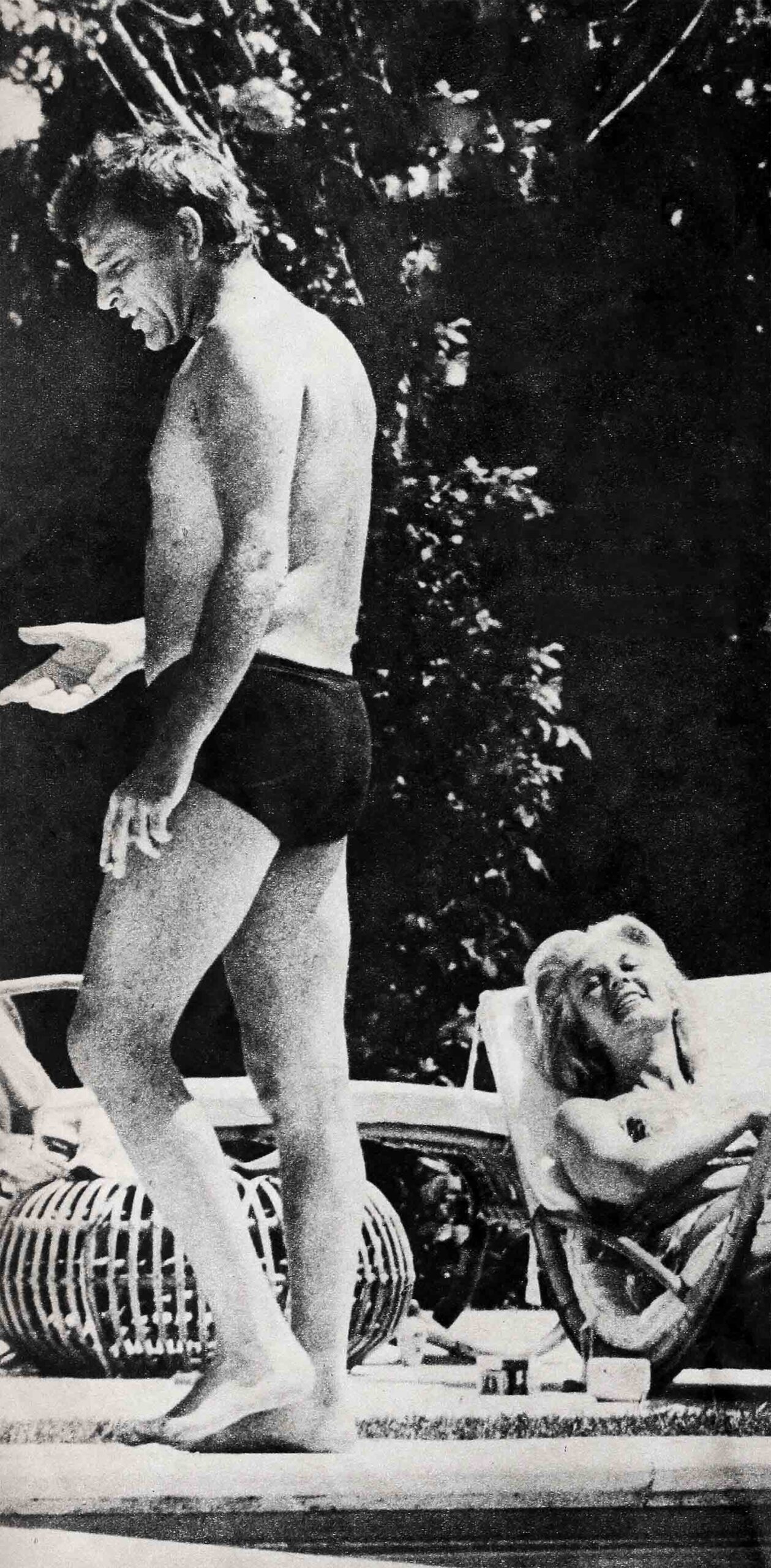
How long will she share him with clinging Cleopatra?
DIAGNOSIS: Liz’ childhood had much to do with forming the woman she is today. She seems to have been raised by a dominant mother who had great ambitions for her daughter, and a father who may have been less demonstrative in his affection than Liz would have liked. Such a parental combination could easily produce a young woman torn by conflicting emotions, one who would seek always for a warm, powerful father-figure while simultaneously conforming to the wishes of a strong, ambitious mother-figure.
Liz rebelled against her mother’s desire for femininity by turning tomboy. She rebelled against restriction by stealing trinkets and selling them. This augmented her meager allowance and, in psychological terms, bought her the affection which she probably yearned for. Her extravagance even today indicates that she still equates money, jewels and high living with love.
She probably preferred pets to people because she felt insecure in the company of other children, and among grown-ups as well—for they fawned over her prettiness and made her feel uncomfortable. In a way, she was forced to behave as a half-child, half-adult, with no outlet for her personal feelings. Such a person might find relief from anxiety in the company of pets where she is “boss,” accepted for herself. But it is not healthy to fulfill one’s emotional needs through friendships with animals—These should remain pets, not friends.
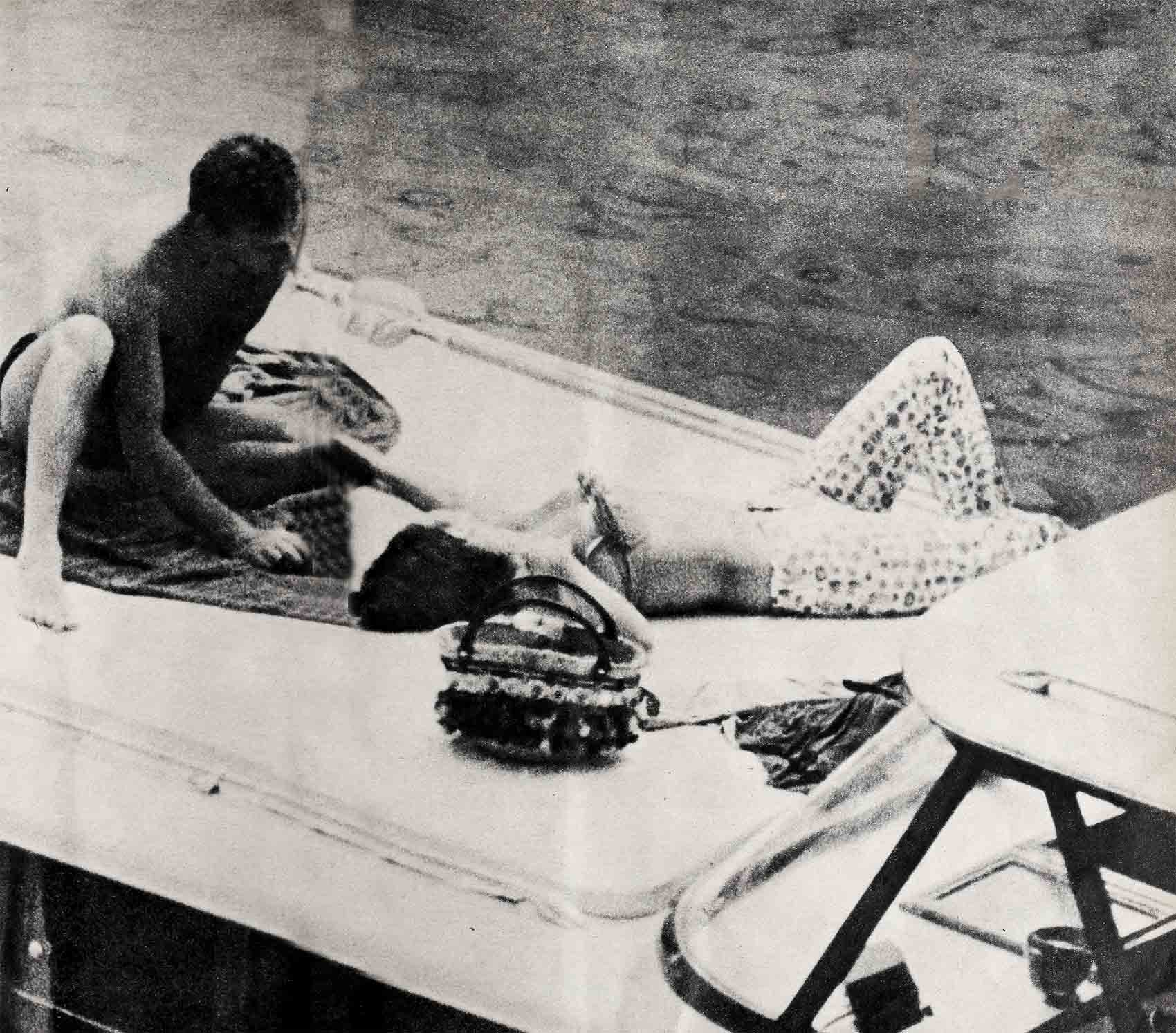
MAKING GOOD: Liz has made dozens of movies and won an Oscar for one: “Butterfield 8”—a picture which she didn’t want to make and which she said “stinks.” Now “Cleopatra,” for which she’ll have been paid more than a million dollars, is in its final stages.
But her good friend Tony Curtis has said, “She never wanted to be an actress.” Her mother has been accused of having pushed her into the profession for economic and other reasons. In fact, Liz has announced her “retirement” from pictures at least eight times. And perhaps, in spite of her seeming poise and self-assurance, Liz does feel uncomfortable in the limelight. She once told a reporter, “As a Child I was so shy I used to hide behind my nurse.”
She has other talents besides acting. She is an excellent artist and a competent writer. She wrote and published a book, “Nibbles and Me,” when she was fourteen, narrating her experiences with her favorite chipmunk.
DIAGNOSIS: Here again we see what a great natural talent this young woman possesses. No doubt she could have succeeded also in art or literature. But because she has told friends she never wanted to be an actress doesn’t mean that she really doesn’t like to act. Such rejection could be a form of rebellion, of getting back at her mother for driving her to this goal. She couldn’t reject it as ruthlessly as her brother did, because she probably needed her mother’s acceptance more—as well as the attention that goes with stardom. Also, economic necessity may have helped to determine her choice.
Acting seems to serve many of her emotional needs. She won the Academy Award for her role as a beautiful but wanton young woman—a social rebel. She frowned on the part but played it to the hilt. As any great actress must, she drew on her unconscious and identified with the role.
Something of her loneliness shines through in her remark about hiding behind her nurse . . . for where was her mother at the time? And this same longing revealed itself when she awakened from her coma during her bout with double pneumonia and murmured, “I want my mother.”
There is still much of the little girl in Liz, judging from these incidents, and this has a lot to do with her love life as an adult woman.
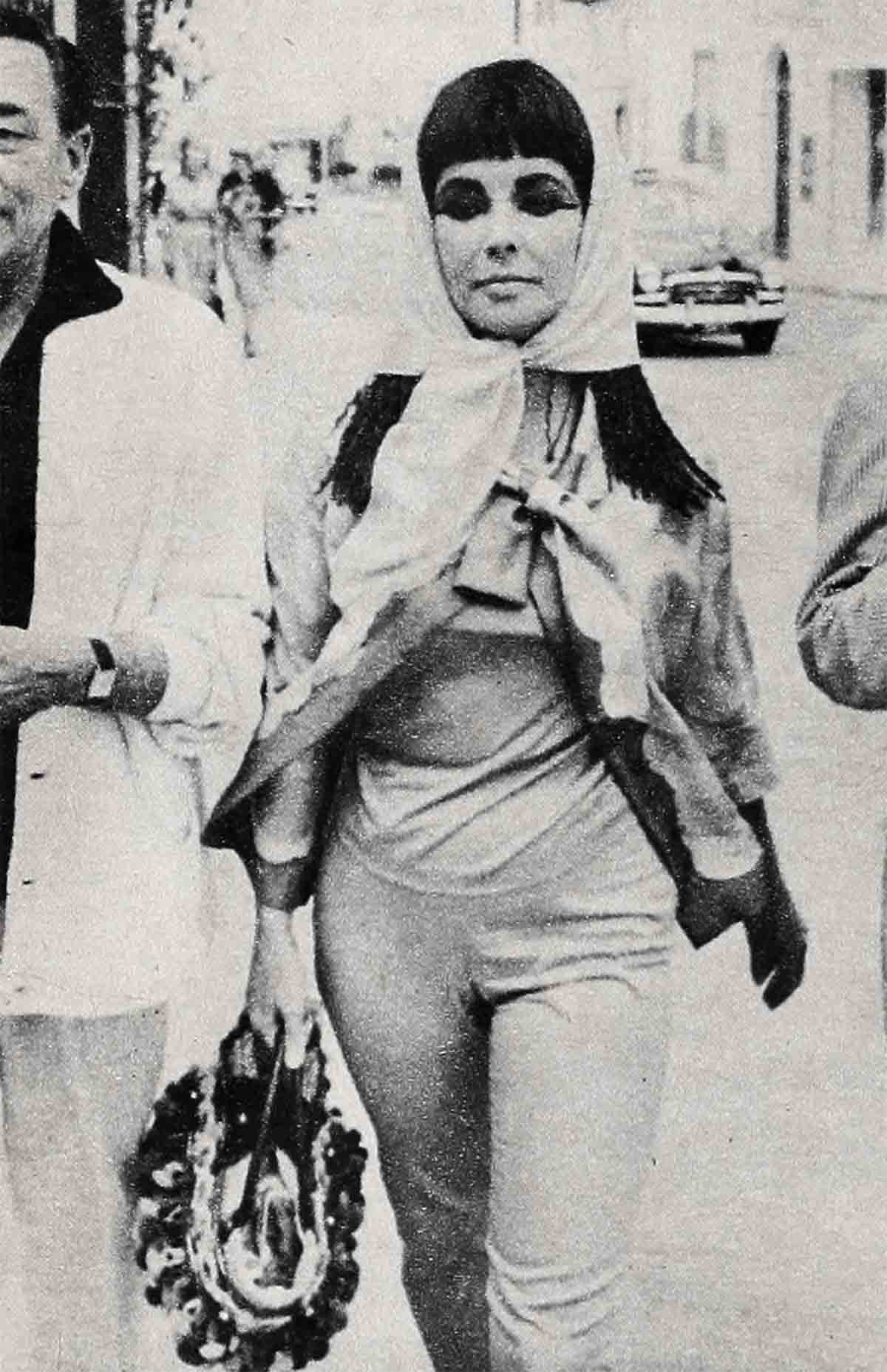
EMOTIONAL AND PHYSICAL LIFE: Liz is a compulsive eater, which explains why she’s had to go on “crash diets” at various times. She loves chili and pizza. Her favorite drinks are either beer or champagne.
She adores jewelry and treasures the $92,000 ring she received from the late Mike Todd. She likes to receive expensive gifts and buy them for herself as well.
Intimates say that she speaks out frankly and is not a hypocrite. She is impetuous and has said, “I very rarely count to ten.” Her ex-husband Michael Wilding sustains this contention. He has remarked, “You must not rub her the wrong way. She upsets very easily.”
She’s been called a warm, affectionate mother—but a strict disciplinarian who won’t tolerate any nonsense from her children. She wants them to grow up as proper ladies and gentlemen. And perhaps this explains her seeming lack of humor: displaying a sense of humor is often considered unladylike.
She is certainly one of the world’s most beautiful women, although she’s modestly denied this. Perhaps she doesn’t truly believe it because while she’ll spend hours making up at some times, at others she’ll kick off her shoes and rub off her makeup, as Eddie Fisher once told the press.
Few women have suffered so much from poor health as has Liz. Oddly enough, she spent a comparatively healthy childhood and adolescence, but after leaving her mother’s domination faced one crisis after another.
She has had a nervous breakdown, colitis, three Caesarean sections, a tonsilectomy, a crushed spinal disc, bronchitis, meningism, anemia, phlebitis, a broken leg, torn knee ligaments, double pneumonia, food poisoning, viruses, colds, the flu, a splinter in her eye, three vertebrae replaced in her spine, a tracheotomy . . . illnesses and accidents by the score!
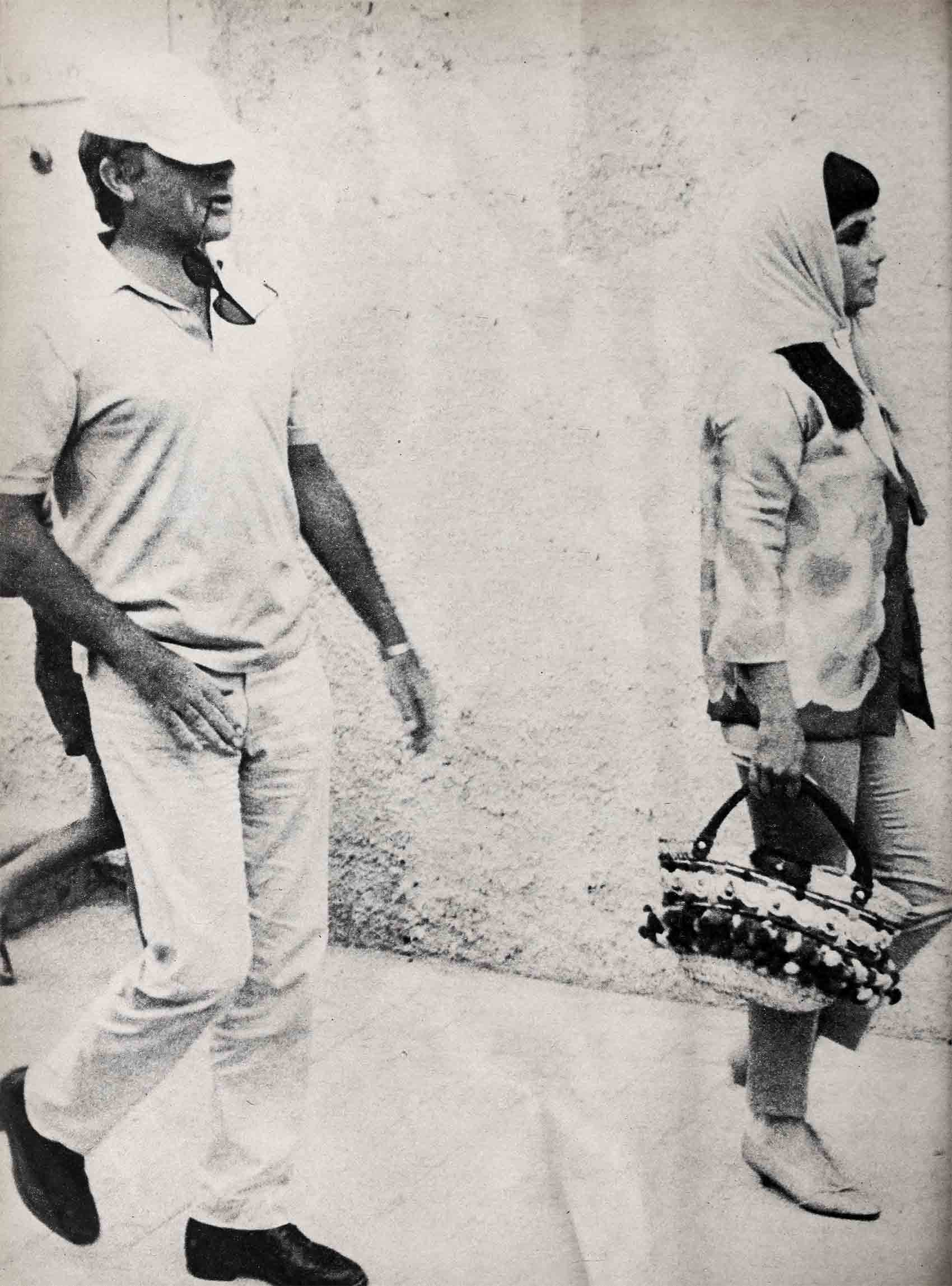
DIAGNOSIS: Here is much of the essence of Liz Taylor. On a psychological level, eating helps to satisfy one’s desire for love. So, too, does collecting jewelry or other trinkets, for these are simply expensive “toys,” such as a child would receive or collect in less expensive form. There is a yearning for childhood in such pursuits. And the swing from beer to champagne further expresses confusion about one’s status: beer is for poor folks who have little money to spend (a la children) while champagne is for those who’ve arrived in the world (a la adult).
Liz may be searching for inner peace and security, but she is mature as can be in her ability to speak frankly and honestly because she feels that she is fully acceptable on other levels: her career accomplishments, her earning power, her prestige.
But she seems uncertain about her intellect. for she once remarked, “I have the face and body of a woman and the mind of a child.” This feeling may explain her impatience with her looks and her desire to be ladylike at all times, even to being stern with her children. She wants to be treated as a lady. On the other hand, she’ll drop her defenses and “kick off her shoes” or play with her kids like a kid herself. This seems to be the essence of her conflict.
It’s quite likely that she is accident-prone and subject to psychosomatic illnesses. Such illnesses became a means of escape from problems one fears that one cannot cope with. So, for example, a child will “take sick” prior to a school exam because he’s afraid he’ll flunk. Psychological studies on accident-proneness reveal that some people behave recklessly without realizing it in order to hurt themselves: a kind of self-punishment for their feelings of worthlessness which may be totally unrealistic.
Such a person might, for example, resent being forced to ride a horse and manage it so badly as to be thrown. This “punishes” the individual for such angry thoughts and at the same time obtains attention and sympathy.
This is immature behavior, to be sure. Of course, in Liz’ case many of her ailments were far from psychosomatic. However. one’s emotions can sometimes break down one’s resistance sufficiently to make one’s body accessible to physical illness.
HER MANY LOVES: Liz’ first date as a teenager was arranged by her mother, who later encouraged her romance with wealthy socialite William Pawley, Jr., and her marriage to Nicky Hilton. On the other hand, she was not fond of Liz’ first real love, football player Glenn Davis, or her later love, actor Stanley Donen.
Liz left Nicky Hilton because he drank and gambled too much, and she married Michael Wilding, who was nineteen years her senior and dating Marlene Dietrich at the time he and Liz met.
Next she married Mike Todd, a widower and grandfather. He was coarse, self-assured. extravagant—and she has said, “Mike taught me how to love.”
After Mike’s sudden death she married Eddie Fisher, Mike’s very close friend and almost like his own son. But Liz was aware of the significance of their relationship when she remarked, “I wondered if it was because I was seeing him as Mike.”
Mike’s pictures hung in her home all the while she was Mrs. Eddie Fisher.
And then came Richard Burton, her co-star in “Cleopatra,” and Joe Mankiewicz, her director, and . . . well, where will it all end. if indeed it ever will?
DIAGNOSIS: The past always comes home to roost in the present. Everything in Liz Taylor’s life served to prepare her for the tumultuous pattern of her marital adventures. A sentimental reader might feel that Liz would have been blissfully happy if she’d married one of the young men to whom her mother objected; but Liz Taylor is far too complicated a woman to dismiss so lightly.
It seems reasonable to suspect that she is searching for a pillar of strength in a husband, someone unconventional enough to accept her own inconsistencies but stable enough to become a loving father-substitute. She seems to be seeking the solution to her private emotional conflicts in others rather than within herself—which is why she is never satisfied.
Nicky Hilton was too weak for her; she couldn’t lean on him for emotional support. Michael Wilding was older but perhaps too passive to meet her needs.
Mike Todd came closest; he was old enough, strong enough and magnanimous enough. Her own feminine intuition suggested that Eddie Fisher may have been only a substitute for Todd, an extension of him. But Eddie was not her “type”; he drew a salary working beside her. Would Todd have done this?
Richard Burton comes of simple origins, an ex-coal miner turned actor, virile, but in the same “line” as Liz. Joe Mankiewicz, however, is a director; he tells her what to do and how to do it, and so assumes an important paternal function.
Liz seems to be seeking the unattainable. She wants to be a child and she wants to be a woman; she wants to have a husband and she wants to have a father; she wants to have close relationships and she wants to be able to shun such relationships; she wants to be a doting mother and she wants to be the center of attention. In short, she wants both to grow up and to never grow up.
With a snap of her fingers, this remarkable and highly talented woman can have almost any man she desires. She offers beauty, fame, an innocence in love that stirs men’s blood. But the happiness that comes of true love must first be sought within oneself. The perfect husband exists only for the woman who recognizes this.
Perhaps this is why Liz Taylor keeps rushing from one man to another without ever finding the one that’s just right . . . because she hasn’t looked in the right place—in her own heart.
THE END
—BY ARTHUR HENLEY WITH DR. ROBERT L. WOLK
It is a quote. PHOTOPLAY MAGAZINE SEPTEMBER 1962




